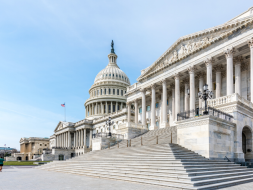Yesterday, Congressional leaders released H.R. 133, the “Consolidated Appropriations Act, 2021”. This Omnibus Appropriations bill includes COVID-19 emergency relief and annual government appropriations for Fiscal Year (FY) 2021. The bill provides $14 billion in COVID-19 emergency funding for public transit. In annual appropriations, the bill provides $15.5 billion for public transportation and passenger rail, an increase from FY 2020 enacted levels.
Emergency relief funding
The relief package includes $45 billion for transportation. Transit receives $14 billion of emergency funding. For urban areas, there is a 75 percent provision of urbanized areas’ public transit operating costs. Additional 5311 emergency funding included was at $679 million level. The transit funds provided under the bill are available for operating expenses related to the response to the COVID-19 public health emergency. The federal share is 100 percent.
The $14 billion for transit includes:
- $13.27 billion for 49 U.S.C. § 5307 grants (including the 49 U.S.C. § 5337 formula) to urbanized areas. The amounts made available for these grants, combined with CARES Act grants, may not exceed 75 percent of the urbanized areas’ 2018 operating costs. For any urbanized area for which the calculation exceeds 75 percent of the urbanized area’s operating costs, the Secretary of Transportation (Secretary) shall distribute excess funds to urbanized areas that did not reach the 75-percent operating cost threshold. The Secretary shall distribute the excess funds in the same proportion as the initial distribution.
- $50 million for enhanced mobility for seniors and people with disabilities formula funds; and
- $679 million for 49 U.S.C. § 5311 grants to rural areas. The amounts allocated to any State for these grants, combined with CARES Act grants, may not exceed 125 percent of the State’s combined 2018 rural operating costs of recipients and subrecipients. For any State for which the calculation exceeds 125 percent of the State’s combined rural operating costs, the Secretary shall distribute excess funds to States that did not reach the 125-percent operating cost threshold. The Secretary shall distribute the excess funds in the same proportion as the initial distribution.
The bill provides several additional conditions for the funding:
- These funds and CARES Act funds shall be directed to payroll and public transit operations (including payroll and expenses of private providers of public transportation) as much as possible.
- Operating expenses do not need to be included in a transportation improvement program, long-range transportation plan, statewide transportation improvement program, or statewide transportation plan.
- The federal share of § 5310 grants and any unobligated balances of § 5310 funds is 100 percent.
- Private providers of public transportation shall be considered eligible sub-recipients under this bill and the CARES Act.
FY21 Omnibus Package
The U.S. Department of Transportation was appropriated $86.7 billion in total budgetary resources, which is $553 million above the 2020 enacted level. The “Transportation, Housing and Urban Development, and Related Agencies Appropriations Act” (THUD Appropriations bill) provides $13.0 billion for public transit and $2.6 billion for passenger rail grants. In total, the bill provides $15.5 billion for public transit and passenger rail, an increase of $100 million compared to the FY 2020 enacted level according to APTA.
The package includes $1 billion for National Infrastructure Investments (TIGER/BUILD grants), same as prior year. The bill’s language calls for a 50/50 split of the grants to go to urban and rural areas.
Additional highlights of the FTA appropriations include:
- $10.8 billion for formula funds
- $2.014 billion for the Capital Investment Grants program:
- $1.17 billion in New Starts funding
- $200 million in Small Starts funding
- $525 million in Core Capacity funding
- $100 million for the Expedited Project Delivery Pilot Program
- $150 million for the Washington Metropolitan Area Transit Authority
- $516 million for transit infrastructure grants:
- $243 million for the Bus and Bus Facilities Program
- $125 million for the Low or No Emission Bus Program
- $40 million for rural area formula grants
- $40 million for high density states grants
- $40 million for state of good repair grants
- $8 million for ferries, with $4 million designated for low or no emission ferries
- $2 million for bus testing facility grants
- $16.22 million for grants for areas of persistent poverty
- $1 million for innovative mobility grants to develop software to facilitate demand response transit
- $1 million for accelerating innovative mobility grants
The Breakdown from The Bus Coalition:

In addition, the alternative fuel excise tax credit, which provides a $0.50 per gasoline gallon equivalent tax credit to transit agencies fueling their vehicles with compressed natural gas or liquefied natural gas, and the alternative fuel refueling property credit are both extended to December 31, 2021.
Additional information:
